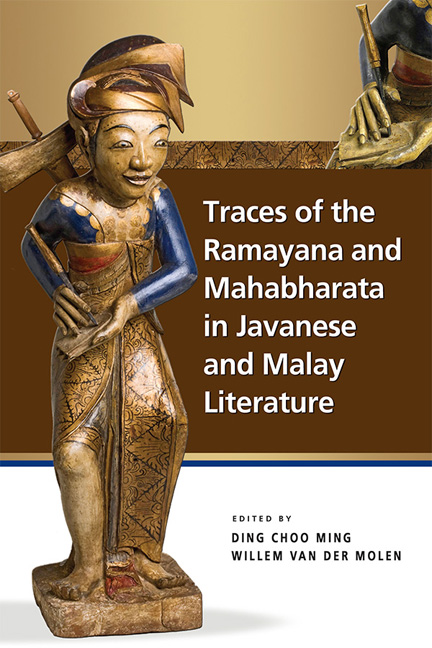Book contents
- Frontmatter
- Contents
- Abbreviations
- About the Contributors
- 1 Introduction
- 2 The Rāmāyaṇa in Java and Bali: Chapters from its Literary History
- 3 Abimanyu Gugur: The Death of Abimanyu in Classical and Modern Indonesian and Malay Literature
- 4 Drona's Betrayal and Bima's Brutality: Javanaiserie in Malay Culture
- 5 Ramayana and Mahabharata in Hikayat Misa Taman Jayeng Kusuma
- 6 The Death of Śalya: Balinese Textual and Iconographic Representations of the Kakawin Bhāratayuddha
- 7 The Illustrated Asṭabrata in Pakualaman Manuscript Art
- Index
- Nalanda-Sriwijaya Series
4 - Drona's Betrayal and Bima's Brutality: Javanaiserie in Malay Culture
Published online by Cambridge University Press: 04 July 2018
- Frontmatter
- Contents
- Abbreviations
- About the Contributors
- 1 Introduction
- 2 The Rāmāyaṇa in Java and Bali: Chapters from its Literary History
- 3 Abimanyu Gugur: The Death of Abimanyu in Classical and Modern Indonesian and Malay Literature
- 4 Drona's Betrayal and Bima's Brutality: Javanaiserie in Malay Culture
- 5 Ramayana and Mahabharata in Hikayat Misa Taman Jayeng Kusuma
- 6 The Death of Śalya: Balinese Textual and Iconographic Representations of the Kakawin Bhāratayuddha
- 7 The Illustrated Asṭabrata in Pakualaman Manuscript Art
- Index
- Nalanda-Sriwijaya Series
Summary
The presence of elements explicitly identified as “Javanese” or “from Java” in traditional Malay literature and performance — settings, characters, objects, idioms, stories, texts, even entire genres like the renditions of Mahabharata story-matter — has mostly been ascribed to the putative prestige of the historical civilization of Java. Here I explore another point of view. Focusing on religiosity and ethics in a hikayat with Mahabharata stories, I propose the notion of javanaiserie, the creation of texts, performances, and other cultural artefacts designed to be considered Javanese. Javanaiserie has proven alluring in Malay contexts. Rather than as a matter of influence I suggest regarding javanaiserie as an active process of worldmaking, the creation of a reality that is culturally at once close to and distinct from an audience's everyday lifeworld, a reality that can be both elegant and evil, appealing as well as appalling.
Keywords: Malay Mahabharata, hikayat, religiosity, javanaiserie, worldmaking.
The “Javanese” Presence in Malay Literature and Performance
It has long been noted by scholars that traditional literature and performance in Malay, as once practised throughout the archipelago, in an area ranging from the island of Java itself, particularly Batavia, up to Kedah and Kelantan in Malaysia, contains elements with explicit and strong Javanese associations. Settings, characters, objects, idioms, stories, texts, even entire genres are explicitly identified as “Javanese” or “from Java”. Certain Malay prose and verse narratives (hikayat and syair) are set at medieval Javanese courts, with Javanese protagonists. These works mostly tell stories about Prince Ino Kertapati (Panji) and his close relatives. Some are labelled as translations from the Javanese language or said to have been performed by narrators in or from Java. An often-discussed example is the Hikayat Andaken Penurat, but there are numerous others (Robson 1969, pp. 7–8; Koster 1997, pp. 55–56; Braginsky 2004, p. 159). There are also, of course, Malay texts with only a few episodes set in Java and with Javanese characters more as antagonists, including the celebrated Sejarah Melayu and Hikayat Hang Tuah. A genre of shadow-play named “Javanese” (wayang Jawa) used to be performed in a variety of Kelantan Malay with Panji and Pandawa narratives — stories about the heroes of the Mahabharata — for its repertoire (Sweeney 1972, pp. 3–25).
- Type
- Chapter
- Information
- Publisher: ISEAS–Yusof Ishak InstitutePrint publication year: 2018



